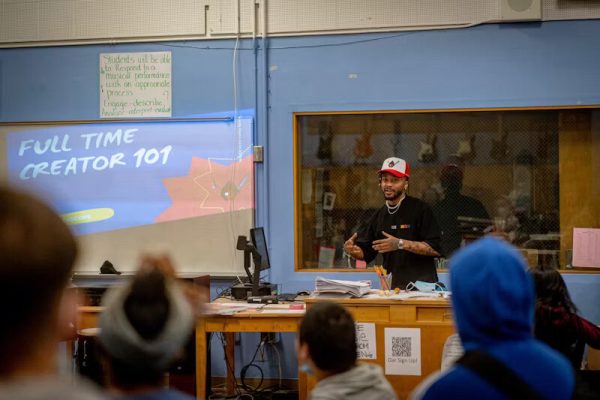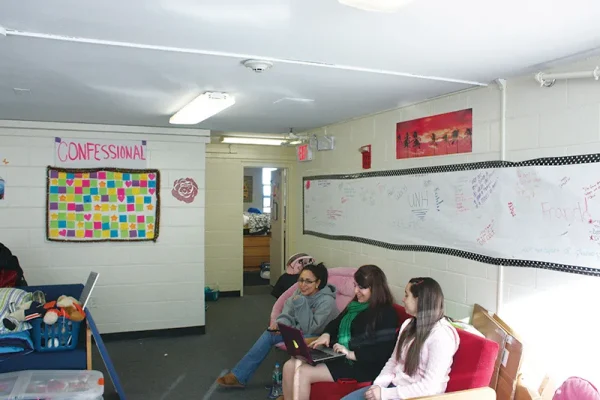Is Core Curriculum Necessary or a Waste of Time and Money?

College is supposed to be the final stepping stone into the “real world.” We choose majors that will help us hopefully enter careers that we love and take courses to educate ourselves in those fields. But not all of those courses will teach us skills within our majors.
If you’ve taken a look at your degree audit or spoken to your advisor, you know about the often dreaded core curriculum. No matter what your major is, all the requirements of the core curriculum must be filled, from math, to science, to global perspectives and history. Science majors must take courses in aesthetic responsiveness. Art majors must take courses in mathematics. A third of the courses we take will not be based on our majors, but what education professionals deem necessary for us. 40 of the 120 credits that we must earn will be dedicated to core curriculum courses. That’s a third of the classes that we’ll take throughout our undergraduate careers.
According to the University of New Haven website, the Core Curriculum is meant to help students “succeed in their chosen careers.” How does an Environmental Science or College Mathematics help Journalism majors become better writers? How does Introduction to Music or American History help Forensic Science majors become better scientists?
As a communication major, I have taken an Environmental Science course with a lab, a Mathematics course, and a scientific methods course, just to name a few. Through every lecture and every lab, I’ve asked one question: “how is this course going to help me as a journalist?” I haven’t been able to answer that question.
There’s no doubt that Math, English and a basic understanding of history is important to enter the workforce. No matter what your career is, you will have to articulate yourself properly. As an adult, you’ll have to use math every day for banking, leaving a tip at a restaurant, or even to adjust the measurements for a recipe in the kitchen. But as students, we’ve already spent twelve years developing those skills.
Just by being accepted into the University of New Haven, we’ve proven that we are educated in those areas. We’ve taken standardized tests, we’ve completed the SAT, proving that we have math and english skills. So why, in the four years that should be dedicated to learning our chosen craft, do we have to go through even more repetitive lessons in subjects that truly have nothing to do with our fields? These lessons will not help us when we enter the workforce. As a journalist, I will never have to determine the slope of a graph or the hypotenuse of a right triangle. As a forensic scientist, another student will never have to recognize Picasso’s Guernica.
The average student at a private, four year college pays $33,000 a year for their education, which costs more than many brand new cars. Pay that much in four years, and it adds up to the cost of a home. Would you buy a home where you wouldn’t use thirty percent of the rooms? Would you buy a car where you couldn’t use the backseat, or the trunk? If the answer is no, why should we, as students, spend thousands of dollars on classes that won’t help us?
It is time for colleges and universities to recognize that core curriculums do not help college students excel in their chosen career field; the only things that can do that are specialized courses in our fields of study. As students who pay for the education that we receive, one thing that we deserve is to not be forced to waste money and time on courses that have no benefit for us.

Lindsey Allen is a senior at the University of New Haven studying Communication with concentrations in Digital Media and TV/Video Production and a minor...










Chris Haynes • Feb 12, 2017 at 6:52 pm
I cannot help but weigh in a bit here. First, I challenge the columnist to elucidate the link she claims there is between core courses (outside one’s major) and a lack of preparedness. The hypothesis is clear, the how and why are not. Moreover, I would like to see some evidence of this link. A poll that shows that American’s do not believe college grads are work ready does not support this claim.
Second, throwing out the core and turning college education into a technical school or training program may actually short circuit the skills development and preparedness both the columnist and Gallup refer to. Courses in the critical thinking tranche of the core do have the ability to develop many skills employers and society believes are important including critical thinking, analytical writing, and researching. That is if the learner is open to it. Perhaps what is needed is an effort on behalf of the educator/advisor to explain the course’s specific job/life implications and the student to embrace the challenge and give the course a chance.
Third, it is also important for her to explain how “major-only” curriculums would positively affect “job and life-preparedness,” and society writ large. This claim too is insufficiently elaborated and in need of systematic evidence to support it. Moreover, the examples (philosophy, ethics, economics) the writer uses to substantiate this claim only further point out the need for core courses.
Fourth, the columnist correctly points out that there are issues in higher education. For instance, there is a need for more backwards design, skills development, critical thinking, and condensed-persuasive writing. That said, many of these issues are not specific to core courses and certainly not specific to this University. In fact, I suspect that the University of New Haven does much better on these metrics that many other research institutions such as the one I attended, University of California, Riverside. Here too, there is a need for additional experimental research to determine how best to reshape the college curriculum to better prepare students for the 21st-century world and jobs.
In closing, while I laud the columnist for raising important issues that deserve attention (skills development and the need for more backwards design) and for pointing out core courses other students should take (i.e. philosophy, economics, ethics), I think the opinion writer’s column and response may benefit from further reflection, discussion, and research—one that I would love to be a part of.
Lindsey Allen • Feb 12, 2017 at 11:24 pm
Thanks for your comments, Professor. After writing this piece and speaking to various sources, I will be starting a follow-up piece on this issue that amends a few of the claims I made in this piece. First and foremost, the idea of abolishing the Core Curriculum entirely. As I said in my rebuttal to Professor McGee’s comment, I believe in reforming the curriculum to both provide more courses in chosen majors and more courses to prepare students for entering the workforce and becoming productive members of society.
Smithe269 • Feb 10, 2017 at 12:38 am
I relish, cause I discovered just what I used to be taking a look for. You’ve ended my 4 day lengthy hunt! God Bless you man. Have a great day. Bye dgdaedkeekgefffc
Glenn McGee • Feb 9, 2017 at 3:57 pm
With all respect, among the best reasons for the core is one I bet you will acknowledge: one day when you are 25 or 30 you will want your kids and your friends to be smart and insightful and you will want to have some context and understanding of the world to share. You will also want to be interesting and well prepared enough that others with knowledge and authority will see you as wise. If you want to take nothing but courses you find interesting at this moment, you should go to community college or a tech school, because no university of any quality – and no potential employer – subscribes to the view that college is just about learning a set of skills in your job area. In fact the most identified reason employers want a BS or BA degree is that it ensures you have more than that. It might look right now like you’ll only use 30% of your courses but it would be pretty amazing if you didn’t benefit a lot from environmental science and scientific research training. I’ve worked with dozens of journalists in my career and I can’t remember meeting even one who didn’t have a core liberal arts education that defined their ability to write. And gave them things to write about. The core is intended to be less restrictive than the old days when advisors gave students virtually no latitude to choose their own curriculum and you couldn’t get free of your own field long enough to explore fields far outside of what you want to do in your job. I’m not saying you have to be a philosopher or an environmental scientist. For whatever it is worth though when I look around me at others who went to college 20 or 30 years ago like me, their entire character is shaped by the same kind of course experiences you have had, and by the friendships they made with students and professors from all over the map. I’m a management professor here but what makes me a good professor, according to my students, is that my classes are based on knowledge that comes from across disciplines. I am glad someone made me take courses in fields I didn’t like a long time ago. Because I would never ever have chosen environmental science courses either, and once I did it changed my life.
I understand your point and honestly no core curriculum could be perfect. In fact maybe instead of a core we should in fact require some courses from different disciplines instead of cores. But the idea that college shouldn’t require courses from across the areas in our core curriculum is like suggesting that college shouldn’t be college at all, but rather a self-guided career school. I am sad that you haven’t had enough good classes outside your major to see how awful that would be. We have courses that will open up a whole world to you in ways you can’t know while you are shopping for classes, and the core is one way in which is we spend a lot of time as faculty trying to make sure that you will see them. If the courses outside your major aren’t great, you should be pretty angry at us because we faculty are supposed to make sure that we at least give you an opportunity to really experience the courses in that way.
You don’t have to, but why not try a weird course from the core, diving headfirst into something you really don’t love yet. Call a professor in a department you don’t know anything about and take her to lunch and ask her why in the world she would ever study XX field. I promise you’ll thank me later. But either way, your editorial itself – lucid and philosophical – makes my point: in order to be skilled enough to change the world or even to have an amazing life, you have to first think of your time in college as an opportunity to explore lots of new ways to think, many of which may not be immediately appealing even though they are actually good, rather than sushi ala carte, where everything has to be immediately delicious or it isn’t priced right. Regards, Glenn McGee, Professor of Management
Lindsey Allen • Feb 11, 2017 at 6:47 pm
Thanks for the well-thought and insightful response. However, I still have a few points. The first is that the one course that I had to take in Mathematics was virtually the same as the one that I took in high school. The one course that I took in English was the same Composition and Literature I took my senior year. While I understand higher education’s purpose of widening a student’s educational horizons, I do not understand the need for taking the same courses at the college level that students have taken in the past. Why not make a home economics course required? How about a professional development course that teaches resume and cover letter writing and interview skills? Those two courses alone would prepare students such as myself so much more prepared for adult life than an Environmental Science course. Even a philosophical course that teaches how to create a sound argument could be beneficial to students.
My main concern is that, as a student who pays an astronomical amount of money to attend this university, I don’t believe that all the courses that I’m offered (or I am forced to take) prepare me for entering the workforce or to be a productive and successful member of society. According to a Gallup-Lumina Foundation poll (link: http://www.gallup.com/opinion/gallup/182867/america-no-confidence-vote-college-grads-work-readiness.aspx?utm_source=CATEGORY_EDUCATION&utm_medium=topic&utm_campaign=tiles), only thirteen percent of Americans can strongly agree that college graduates in America are well-prepared for success in the workplace.
While an argument can be made that a diversified education can be helpful, the most important things coming out of college are that graduates are both well-prepared for the workforce and properly educated to enter it. It’s great that you learned a lot from being forced to take courses outside your field of study, but the system that we have in place right now clearly is not working the way that it should. What is important is that we change that to something that all Americans, not just educators such as yourself, believe works. A college degree is useless if no one believes that it prepares students. Right now, college is really simply an extension of high school, learning the same lessons from American history to algebra, which is not doing college students any favors. As I said before, the most important skills for students to learn in a post-secondary environment are skills to be a productive member of society. Yes, this includes more than just career-related courses, such as basic philosophy (how to construct an argument, ethics), economics (how to create a budget, the basics of the American economy, etc.), and absolutely professional development (interview skills, resume/cover letter writing, the best practices in applying for jobs, internship placement/opportunities).
The main point that I’m trying to make and that I hope both you and other educators take away from this is that the majority of people in this country do not believe that college is doing enough for students to be prepared to enter the workforce. Changing the core curriculum that we have in place now is the first step in changing that.